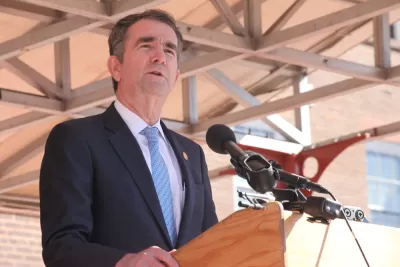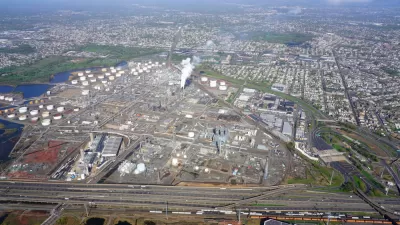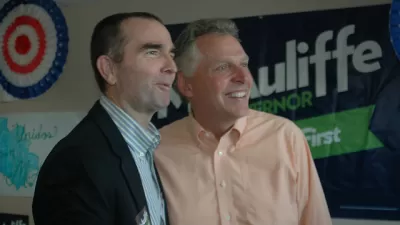The Virginia Air Pollution Control Board approved a cap-and-trade policy for utilities to join the Regional Greenhouse Gas Initiative, but Republicans added language in the state budget bill to prevent it.

On April 19, the State Air Pollution Control Board voted 5-2 to adopt a regulation that "ensures that Virginia is 'trading-ready' to allow for the use of market-based mechanisms and the exchange of CO2 allowances through a multi-state carbon market," according to the Virginia Department of Environmental Quality.
This regulation when implemented will reduce carbon emissions from these facilities by 30 percent by 2030, with an initial cap of 28 million tons of CO2. Virginia will become the 12th state [sic] in the nation, and the first southern state, to regulate carbon pollution.
Passing the resolution was necessary for the Old Dominion State to join the nine-state Regional Greenhouse Gas Initiative (RGGI), the first mandatory market-based program in the United States to reduce greenhouse gas emissions, though only from electric power plants. RGGI applauded [pdf] their vote. When California's more expansive cap-and-trade program is considered, Virginia would become the 11th state to price carbon.
However, "Republican lawmakers put language into the state budget that effectively prevents Virginia from participating," reports Gregory S. Schneider for The Washington Post.
Republicans in the General Assembly argued this year that the system amounts to a tax on businesses. Del. Charles D. Poindexter (R-Franklin) sponsored a bill that prohibited the governor from entering into the regional program and gave authority for any such decision to the General Assembly.
Gov. Ralph Northam, a Democrat who had served as lieutenant governor to Gov. Terry McAuliffe (D) who got the climate ball rolling with RGGI in a 2017 executive order [pdf], vetoed Pointdexter's bill and a second one that dealt with motor vehicle emissions.
"Like other air pollutants, the emissions that cause climate change do not respect state lines, district lines, or other political boundaries," stated the governor in his veto message on HB 2269: Regional transportation sector emissions programs [see second 'related post' below], that also applies to HB 2611: Regional Greenhouse Gas Initiative; prohibition on participation by Commonwealth.
"In the absence of a federal plan, Virginia is obligated to join other states and face this threat to our collective public safety and economic health."
Now it's up to Northam to line-item veto the language added to the budget bill that would prevent the state from becoming the tenth member of RGGI. He must do so by May 3. "Northam’s office declined to say what he intends to do," adds Schneider.
Related:
-
Gubernatorial Elections Have Environmental Consequences, November 13, 2017A movement initiated by Gov. Terry McAuliffe (D-Va.) to join the East Coast carbon cap-and-trade program has accelerated with the election of his Democratic lieutenant governor, Ralph Northam, as governor. Similar news is expected from New Jersey.
-
An East Coast Cap-and-Invest Approach to Reducing Transportation Emissions, December 20, 2018Nine Mid-Atlantic and Northeast states and the District of Columbia have agreed to work together to develop a policy to price emissions from transportation, set a 'cap' on them, and invest the revenues in low carbon transportation solutions.
FULL STORY: Virginia regulators vote to limit carbon emissions but face GOP roadblock

Study: Maui’s Plan to Convert Vacation Rentals to Long-Term Housing Could Cause Nearly $1 Billion Economic Loss
The plan would reduce visitor accommodation by 25,% resulting in 1,900 jobs lost.

North Texas Transit Leaders Tout Benefits of TOD for Growing Region
At a summit focused on transit-oriented development, policymakers discussed how North Texas’ expanded light rail system can serve as a tool for economic growth.

Using Old Oil and Gas Wells for Green Energy Storage
Penn State researchers have found that repurposing abandoned oil and gas wells for geothermal-assisted compressed-air energy storage can boost efficiency, reduce environmental risks, and support clean energy and job transitions.

Private Donations Propel Early Restoration of Palisades Playground
Los Angeles has secured over $1.3 million in private funding to restore the Pacific Palisades playground months ahead of schedule, creating a modern, accessible space that supports community healing after recent wildfires.

From Blight to Benefit: Early Results From California’s Equitable Cleanup Program
The Equitable Community Revitalization Grant (ECRG) program is reshaping brownfield redevelopment by prioritizing projects in low-income and environmental justice communities, emphasizing equity, transparency, and community benefits.

Planting Relief: Tackling Las Vegas Heat One Tree at a Time
Nevada Plants, a Las Vegas-based nonprofit, is combating the city’s extreme urban heat by giving away trees to residents in underserved neighborhoods, promoting shade, sustainability, and community health.
Urban Design for Planners 1: Software Tools
This six-course series explores essential urban design concepts using open source software and equips planners with the tools they need to participate fully in the urban design process.
Planning for Universal Design
Learn the tools for implementing Universal Design in planning regulations.
Ascent Environmental
Borough of Carlisle
Institute for Housing and Urban Development Studies (IHS)
City of Grandview
Harvard GSD Executive Education
Toledo-Lucas County Plan Commissions
Salt Lake City
NYU Wagner Graduate School of Public Service





























